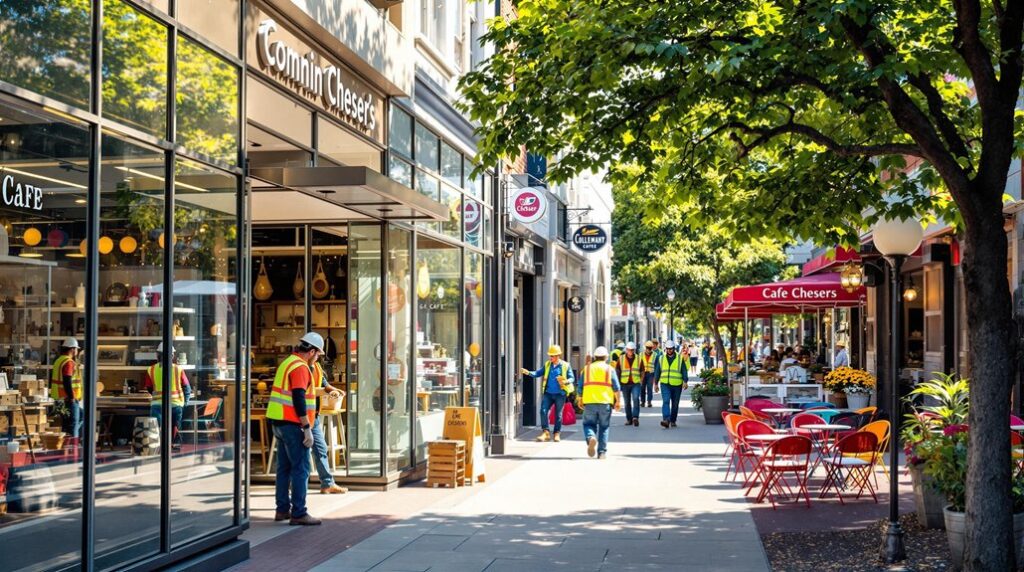Local commercial project services are essential for driving community growth and economic sustainability. They provide tailored solutions for businesses, ensuring developments align with local needs. Effective project management oversees timelines, budgets, and stakeholder coordination, fostering transparency and trust. Design considerations emphasize accessibility, sustainability, and cultural integration, enhancing community identity. Financing options range from traditional loans to crowdfunding, helping local ventures thrive. Explore the various aspects to gain a deeper understanding of these impactful services.
Understanding Local Commercial Projects
Understanding local commercial projects is essential for anyone interested in the dynamics of community development and economic growth. These projects typically encompass various business ventures, including retail stores, office buildings, and service-oriented establishments. You'll find that they play a significant role in job creation, enhancing local tax revenues, and improving community infrastructure. Additionally, local commercial projects often reflect the unique characteristics and needs of a community, which is important for fostering a sense of place and identity. By engaging with these projects, you can gain insights into the collaboration between local governments, businesses, and residents. This interaction is pivotal in shaping a thriving economic landscape, making it imperative for you to understand the various components and stakeholders involved in these initiatives.
Importance of Project Management in Local Developments
Effective project management is essential in local developments, as it guarantees that projects are completed on time, within budget, and to the required quality standards. You need to coordinate various stakeholders, including contractors, suppliers, and community members, ensuring everyone is aligned with the project goals. By establishing clear timelines and milestones, you can track progress and make adjustments as needed, preventing costly delays. Additionally, effective risk management allows you to identify potential issues early, enabling you to mitigate them before they escalate. This structured approach fosters accountability and transparency, which builds trust within the community. Ultimately, strong project management leads to successful local developments that meet the needs of residents and contribute positively to the local economy.
Design Considerations for Community-Focused Spaces
When designing community-focused spaces, several key considerations come into play that directly influence their functionality and appeal. Prioritize accessibility to guarantee everyone can enjoy the space. Additionally, integrating flexible layouts allows for various activities, fostering community engagement. Sustainability is vital; utilizing eco-friendly materials and practices enhances the environmental impact. Furthermore, safety features must be embedded in the design to promote a secure atmosphere. Finally, incorporating local culture can create a sense of belonging and pride among residents.
| Consideration | Description | Impact on Community |
|---|---|---|
| Accessibility | Ensure spaces are usable for all abilities | Inclusive community access |
| Flexibility | Design adaptable layouts for diverse activities | Increased usage and engagement |
| Sustainability | Use eco-friendly materials and practices | Positive environmental impact |
| Safety | Implement security features and lighting | Enhanced community trust |
| Local Culture | Reflect community identity in design | Strengthened community pride |
Construction Services Tailored for Local Businesses
As local businesses endeavor to enhance their physical presence, tailored construction services become essential for meeting specific needs. These services include thorough project management, ensuring timelines and budgets align with your vision. Skilled contractors focus on the unique requirements of your business, whether it's a retail space, office, or restaurant. They collaborate closely with you to understand your goals, translating them into functional designs that attract customers and enhance productivity. Additionally, local construction teams possess knowledge of zoning regulations and building codes, streamlining the process and minimizing delays. Custom solutions, such as energy-efficient systems and sustainable materials, can also be integrated, helping your business stand out while reducing operational costs. This approach ultimately supports long-term growth and success.
Financing Options for Local Commercial Ventures
Exploring financing options for local commercial ventures is essential for business owners aiming to establish or expand their presence. Various funding sources can help you achieve your goals, each with unique benefits and requirements. Understanding these options allows you to make informed decisions tailored to your business needs.
- Traditional Bank Loans: Offer lower interest rates but require solid credit and collateral.
- Small Business Administration (SBA) Loans: Government-backed loans that provide favorable terms and conditions.
- Investors: Bringing in partners can offer capital but may require sharing equity.
- Crowdfunding: Engaging the community through online platforms can raise funds without debt.
- Grants: Look for local or federal grants aimed at supporting small businesses.
The Role of Collaboration in Successful Projects
Collaboration plays an essential role in the success of local commercial projects, as it fosters innovation and resource sharing among stakeholders. When you bring together diverse perspectives, you're more likely to identify unique solutions to common challenges. Effective communication among team members enhances understanding, speeds up decision-making, and minimizes misunderstandings. By establishing clear roles and responsibilities, everyone knows what's expected, which increases accountability. Additionally, partnerships can lead to cost savings through shared resources and expertise, allowing projects to stay within budget. Ultimately, collaboration creates a sense of community and shared purpose, which can drive motivation and commitment. In this environment, stakeholders feel empowered to contribute their best ideas, greatly elevating the project's overall potential for success.
Sustainability Practices in Local Developments
Incorporating sustainability practices into local developments is essential for minimizing environmental impact while enhancing community well-being. You can implement various strategies that not only promote ecological balance but also foster economic growth. These practices can lead to reduced costs and improved quality of life for residents. Consider the following approaches:
- Utilize renewable energy sources, such as solar or wind power.
- Implement green building materials that minimize resource consumption.
- Incorporate efficient water management systems to conserve water.
- Design green spaces that promote biodiversity and community interaction.
- Encourage local sourcing of materials to reduce transportation emissions.
